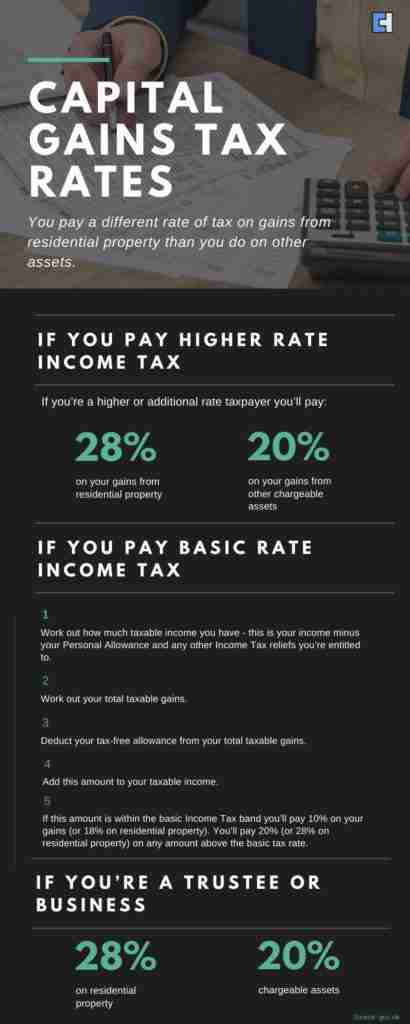Capital gains Tax when selling a property
From 6th April 2020, the way that Capital Gains Tax (CGT) on property gains is calculated and paid is changing. In this article, we will outline the new requirements and how you can take advantage of the new rules.
Capital Gain Tax can become complicated due to different rules present for different assets. It is recommended to speak to an expert tax accountant before you make any claims or submit any documents to HMRC.
How is the timing effected by the new CGT changes?
In the previous years, up to and including April 5th, 2020, tax due on the disposal of a property could be delayed anywhere between 10 to 22 months, depending on when the disposal took place. However, under the new rules, HMRC has accelerated the payment timeline.

What are the New Changes for Capital Gains Tax?
From April 6th, 2020, for any sales of a residential property where there is capital gains tax due, a return will need to be filed to report the gain to HMRC. Also, the notional CGT due will need to be paid. Both requirements are subject to a 30-day time limit which starts from the date of completion.
This rule has been in effect for non-UK residents since April 2017, and from April 6th, 2020, it is applicable to UK residents as well.
Tip: The return that needs to be filed for CGT gains is different from a self-assessment tax return. There also might be some other circumstances where filing a return might not be required:
- The gain is exempt from schemes or reliefs such as Availability of Private Residence Relief, Enterprise Investment Scheme Defferal or other reliefs.
- There is no tax payable because there is enough annual exemption available
- The gain will be decreased to zero due to brought forward capital losses.
Video: A Brief Guide to Capital Gains Tax
Watch the video to learn more about Capital Gains Tax whether you are a Self-Employed, a Limited Company, Sole trader or Partner.
Related: Learn the tax aspects of selling your business and how to tax on gains.
What are the requirements for Capital Losses?
If there is a capital loss as a result of property disposal, then a return isn’t required. If you have a CGT gain on another property, you will be required to file a return. However, you can offset the gains against your CGT losses. The losses can be from the current year or brought forward from previous years.
Also, if you have filed a return and paid the notional tax for another property, you can get a refund on the notional tax if you report your property disposal loss
Tip: The losses must be recognised before the property gain for it to be able to reduce the notional CGT, forcefully crystallising a loss to reduce the gain will not work.

How do the new CGT rules affect Self-assessment?
It may seem like the new return and charge has replaced the self-assessment return that needs to be filed. However, you still need to file a self-assessment on which you report your gains/losses from the sale of a property. The notional tax you pay will be considered as a payment on account for the CGT for the year.
Related: Read our comprehensive Guide on Self-Assessment or speak to our accountants for help with self-assessment online.
Tip: You should file your return as soon as possible and give your tax accountant all the necessary information as soon as possible after April 5th. If some information is unavailable, you can ask them to file a return with estimated figures which they can revise as and when the information becomes available. Also, you may be able to push back the payment date of the notional tax to the self-assessment date, if the due date for the return is after the self-assessment is submitted.
How are Claims affected by the new CGT rules?
When calculating the notional tax, claims for relief, such as Private Residence Relief, can be taken into consideration. Nevertheless, the claims also need to be claimed in the self-assessment for it to be effective.
What are the challenges with the new CGT rules?
One of the main challenges with the new Capital Gains Tax rules is the time limit. That is why it’s imperative that you hand over all the necessary information to your accountant as soon as possible. In some cases, your conveyancing solicitor might file the return for you. However, your accountant will be in a better position to complete your return as they know your entire tax situation so that you are not overpaying the notional tax.
Tip: Contact your accountant before the completion date for any and all property disposals, so they can advise you accordingly, even if someone else like a conveyancing solicitor is creating your return.
Related: Stay updated on how the UK government has provided relief for businesses during the COVID-19 pandemic by going through the budget summary 2020 curated by our accountants.
Summary
- For UK residential property disposals where tax is payable, you must make sure that you report and pay a national CGT charge within the first 30 days of completion.
- If the exchange of contract happens just before the end of a tax year, ask your accountant to submit your self-assessment return first. By doing this, the payment date will be extended to 31st January.
Clear House Accountants are professional Accountants in London with valuable expertise and experience in the field of tax. Our accountants ensure that their clients always stay on top of their finances and tax-related affairs by helping them identify valuable tax reliefs, working out their annual taxes, and helping them file their tax returns accurately.









































































